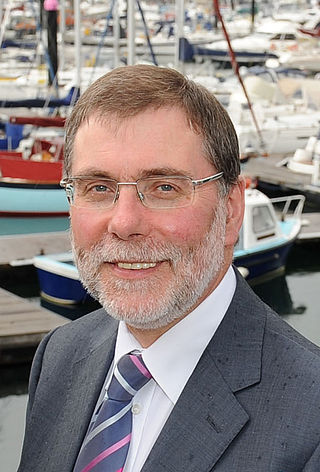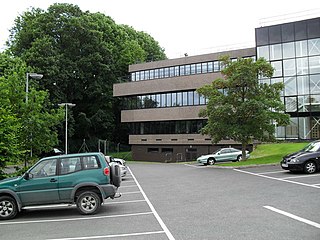
The secretary of state for Northern Ireland, also referred to as the Northern Ireland secretary or SoSNI, is a secretary of state in the Government of the United Kingdom, with overall responsibility for the Northern Ireland Office. The incumbent is a member of the Cabinet of the United Kingdom.

The Democratic Unionist Party (DUP) is a unionist, loyalist, and national conservative political party in Northern Ireland. It was founded in 1971 during the Troubles by Ian Paisley, who led the party for the next 37 years. Currently led by Jeffrey Donaldson, it is the second largest party in the Northern Ireland Assembly, and is the fifth-largest party in the House of Commons of the United Kingdom. The party has been described as centre-right to right-wing and socially conservative, being anti-abortion and opposing same-sex marriage. The DUP sees itself as defending Britishness and Ulster Protestant culture against Irish nationalism and republicanism. It is also Eurosceptic and supported Brexit.

The Northern Ireland Assembly, often referred to by the metonym Stormont, is the devolved legislature of Northern Ireland. It has power to legislate in a wide range of areas that are not explicitly reserved to the Parliament of the United Kingdom, and to appoint the Northern Ireland Executive. It sits at Parliament Buildings at Stormont in Belfast.
The Northern Ireland Executive is the devolved government of Northern Ireland, an administrative branch of the legislature – the Northern Ireland Assembly. It is answerable to the assembly and was initially established according to the terms of the Northern Ireland Act 1998, which followed the Good Friday Agreement. The executive is referred to in the legislation as the Executive Committee of the assembly and is an example of consociationalist ("power-sharing") government.

The governor of Northern Ireland was the principal officer and representative in Northern Ireland of the British monarch. The office was established on 9 December 1922 and abolished on 18 July 1973.

Royal Hillsborough, more commonly known simply as Hillsborough, is a village and civil parish in County Down, Northern Ireland, 19 km (12 mi) from the city of Belfast. It is within the Lisburn and Castlereagh District Council area. The village is noted for its Georgian architecture. It is home to Hillsborough Castle, the British royal family's official residence in Northern Ireland, and residence of the British Secretary of State for Northern Ireland.

The Northern Ireland Office is a department of His Majesty's Government responsible for Northern Ireland affairs. The NIO is led by the Secretary of State for Northern Ireland and is based at Erskine House in Belfast City Centre and 1 Horse Guards Road in London.

Hillsborough Castle is an official government residence in Northern Ireland. It is the official residence of the Secretary of State for Northern Ireland, and the official residence in Northern Ireland of the British monarch and other members of the British royal family when they visit the region, as well as a guest house for prominent international visitors.

In the United Kingdom, devolved matters are the areas of public policy where the Parliament of the United Kingdom has devolved its legislative power to the national assemblies of Scotland, Wales and Northern Ireland, while reserved matters and excepted matters are the areas where the Parliament retains exclusive power to legislate.

The Executive Committee or the Executive Committee for Northern Ireland was the government of Northern Ireland created under the Government of Ireland Act 1920. Generally known as either the Cabinet or the Government, the executive committee existed from 1922 to 1972. It exercised executive authority formally vested in the British monarch in relation to devolved matters.
The St Andrews Agreement is an agreement between the British and Irish governments and Northern Ireland's political parties in relation to the devolution of power in the region. The agreement resulted from multi-party talks held in St Andrews in Fife, Scotland, from 11 to 13 October 2006, between the two governments and all the major parties in Northern Ireland, including the two largest, the Democratic Unionist Party (DUP) and Sinn Féin. It resulted in the restoration of the Northern Ireland Assembly, the formation of a new Northern Ireland Executive and a decision by Sinn Féin to support the Police Service of Northern Ireland, courts and rule of law.

The 2007 Northern Ireland Assembly election was held on Wednesday, 7 March 2007. It was the third election to take place since the devolved assembly was established in 1998. The election saw endorsement of the St Andrews Agreement and the two largest parties, the Democratic Unionist Party (DUP) and Sinn Féin, along with the Alliance Party, increase their support, with falls in support for the Ulster Unionist Party (UUP) and the Social Democratic and Labour Party (SDLP).

Nelson McCausland is a former Democratic Unionist Party (DUP) politician from Northern Ireland, who was a Member of the Northern Ireland Assembly (MLA) for North Belfast from 2003 until he lost his seat in 2017. and served as Minister of Culture, Arts and Leisure (2009–2011) and subsequently Minister for Social Development (2011–2014) in the Northern Ireland Executive.

The Traditional Unionist Voice (TUV) is a unionist political party in Northern Ireland. In common with all other Northern Irish unionist parties, the TUV's political programme has as its sine qua non the preservation of Northern Ireland's place within the United Kingdom. A founding precept of the party is that "nothing which is morally wrong can be politically right".
The British–Irish Intergovernmental Conference (BIIGC) is an intergovernmental organisation established by the Governments of Ireland and the United Kingdom under the Good Friday Agreement in 1998. It first met in London in 1999, and the latest meeting took place at Farmleigh House in Dublin on 19 January 2023.

The Good Friday Agreement (GFA), or Belfast Agreement, is a pair of agreements signed on 10 April 1998 that ended most of the violence of the Troubles, an ethno-nationalist conflict in Northern Ireland that had prevailed since the late 1960s. It was a major development in the Northern Ireland peace process of the 1990s. It is made up of the Multi-Party Agreement between most of Northern Ireland's political parties, and the British–Irish Agreement between the British and Irish governments. Northern Ireland's present devolved system of government is based on the agreement.

The Department of Justice is a government department in the Northern Ireland Executive, which was established on 12 April 2010 as part of the devolution of justice matters to the Northern Ireland Assembly. The position of Minister for Justice is currently vacant. The department's Permanent Secretary is Richard Pengelly. It combines the previous work of the Northern Ireland Office and the Ministry of Justice, within the United Kingdom Government, which were respectively responsible for justice policy and the administration of courts in Northern Ireland.
A cross-community vote or cross-community support is a form of voting used in the Northern Ireland Assembly according to the provisions of the 1998 Good Friday Agreement. It requires the support of both main communities in Northern Ireland, in other words majority of unionists and the majority of nationalist members of the Assembly. Among other reasons, it arises when the petition of concern procedure is invoked.
Events during the year 2010 in Northern Ireland.
The Committee for Justice is a Northern Ireland Assembly committee established to advise, assist and scrutinise the work of the Department of Justice. The Committee undertakes a scrutiny, policy development and consultation role with respect to the Department of Justice and plays a key role in the consideration and development of legislation.












